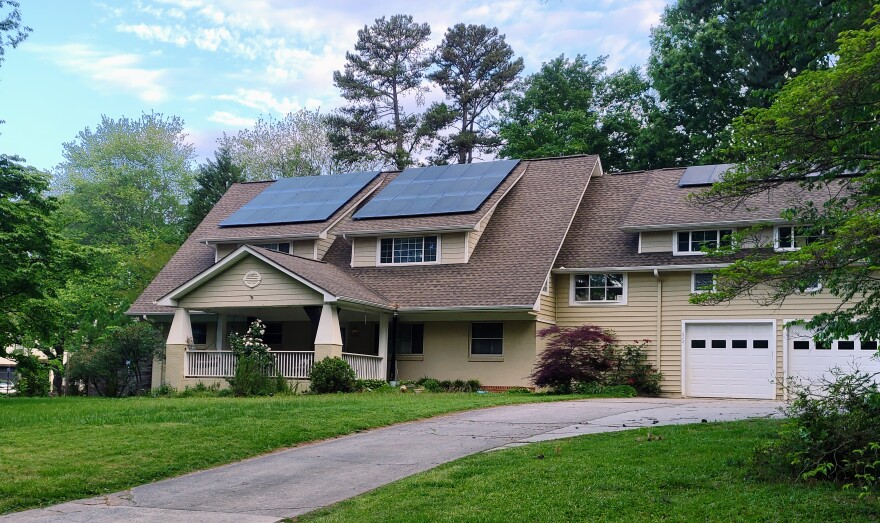This story appeared first in WFAE reporter David Boraks' weekly newsletter. Subscribe today to get Climate News straight to your email inbox each week.
North Carolina is getting ready to overhaul how owners of residential rooftop solar panels get paid, including reducing what Duke Energy pays for excess electricity sent to the grid. But it won't happen as soon as expected.
The new "net metering" rules approved by the North Carolina Utilities Commission in March were supposed to take effect on July 1. Some solar groups and Duke Energy asked regulators to delay the start date until Oct. 1, saying more time is needed to develop an online savings calculator that incorporates the new rates.
Regulators gave Duke until July 1 to update the savings calculator, so people have time to use it before the new rules take effect Oct. 1.
North Carolina's rooftop solar payment rules have been in place since 2000. Customers whose solar panels produce more electricity than they need get credits on their bills equal to whatever they pay for electricity. That can mean big savings, an incentive for customers to install solar panels.
But Duke Energy has argued that the current system is unfair to non-solar customers because those payments are too high and amount to a subsidy for solar owners. Solar advocates disagree with Duke’s analysis.
The new system approved by regulators adopts Duke Energy's plan to reduce what solar owners get paid and to add a new $10 monthly fee for residential customers who install solar panels. Credits for excess electricity would vary according to the time of day. It also adds a "grid access fee" for solar systems larger than 15 kilowatts, according to the utilities commission.
The new rules don't apply to rooftop solar owners who install systems before Sept. 30. They'll be able to keep the current rates and rules until the end of 2026, under a state law that required net metering reforms.
Meanwhile, opponents of the changes are hoping to block the new rules. A coalition of groups is asking regulators to delay the rules so the state Court of Appeals can decide whether the utilities commission erred by not conducting an independent study of the costs and benefits of rooftop solar. The groups filed a notice of appeal with the court on May 18.
The coalition includes the Environmental Working Group, NC WARN, Sunrise Durham, 350 Charlotte, 350 Durham, the NC Climate Solutions Coalition, NC Alliance to Protect Our People and the Places We Live.
Opponents say the new system could stifle growth of the solar industry.
“Net metering has long been a cornerstone of North Carolina’s residential solar program, enabling homeowners to generate their own clean, renewable energy and receive fair compensation for any surplus energy they sell back to the grid,” Caroline Leary, general counsel and chief operating officer at the Environmental Working Group, said in a press release.
Separately, opponents are also concerned about potential changes to rules for rooftop solar installations at businesses, local governments and nonprofit and faith groups. In particular, they're concerned that Duke Energy is seeking to change those rules without public proceedings.
"These changes would reduce the value of solar systems for those customers. Instead of seeking a full and open proceeding focusing on this extremely important issue, Duke Energy buried these changes deep in its ongoing rate-increase cases at the commission," Jim Warren, executive director of NC WARN, said in a May 11 letter to Gov. Roy Cooper and Attorney General Josh Stein.







